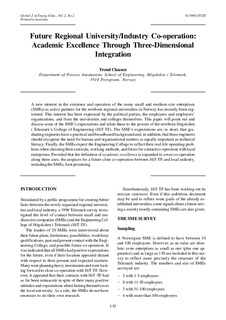| dc.description.abstract | A new interest in the existence and operation of the many small and medium size enterprises (SMEs) as active partners for the newborn regional universities in Norway has recently been registered. This interest has been expressed by the political parties, the employees and employers’organisations, and from the universities and colleges themselves. This paper will point out and discuss some of the SME’s expectations and relate these to the powers of the newborn Høgskolen i Telemark’s College of Engineering (HiT-TF). The SME’s expectations are, in short, that graduating engineers have a practical and broadbased background and, in addition, that these engineers should recognise the need for human and organisational matters as equally important as technical literacy. Finally, the SMEs expect the Engineering College to reflect their real-life operating problems when choosing their curricula, working methods, and forms for contact/co-operation with local enterprises. Provided that the definition of academic excellence is expanded to cover co-operation along three axes, the auspices for a future close co-operation between HiT-TF and local industry,including the SMEs, look promising | |
